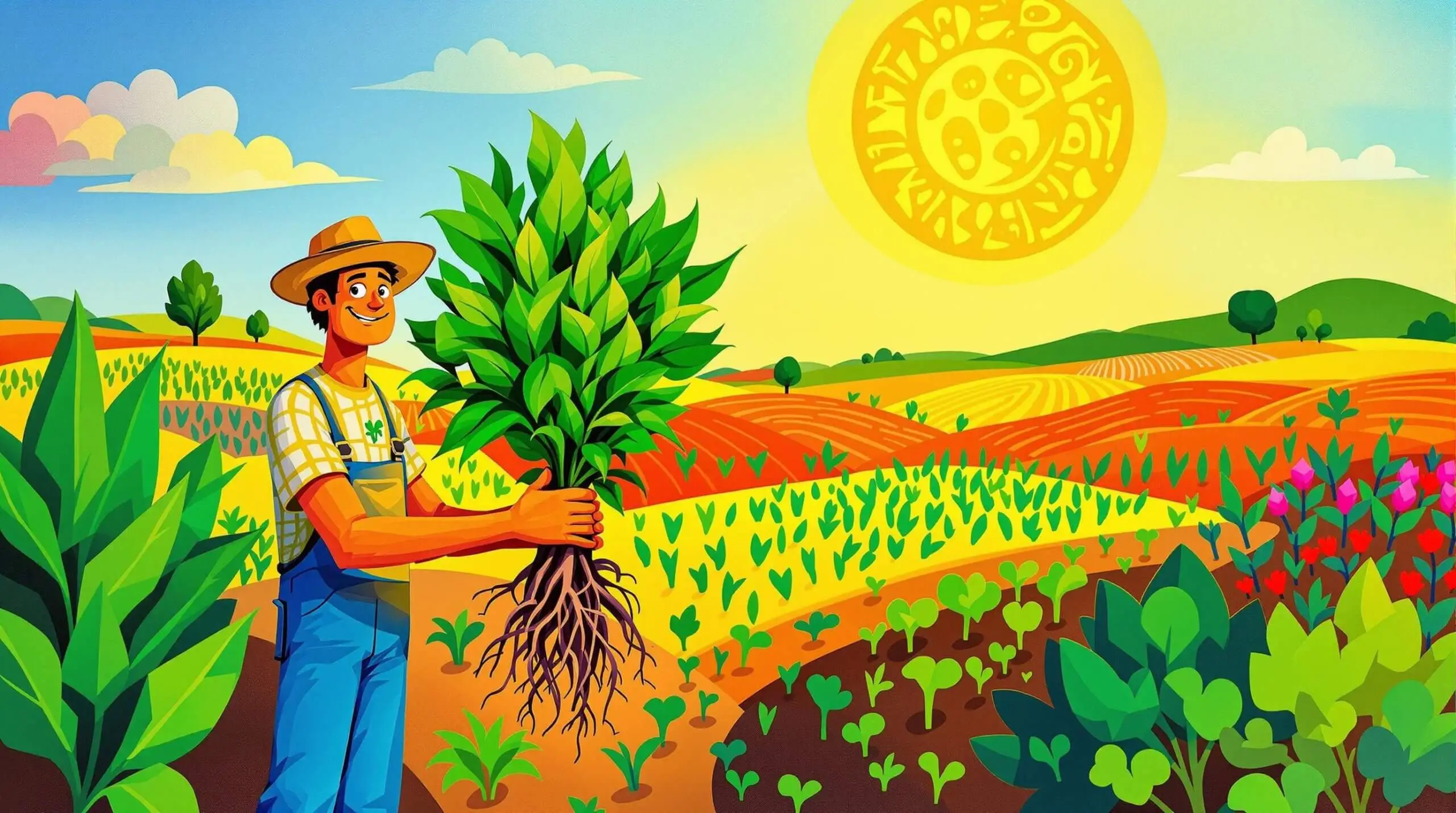Soil Health, Human Health: Farming’s Link to Lifespan
Exploring the vital connection between soil health and human lifespan through sustainable farming practices.

The Vital Connection: Soil and Human Health
The Foundation of Life: Understanding Soil Health
Healthy soil isn’t just dirt – it’s a living ecosystem teeming with billions of microorganisms. This microscopic world directly affects the nutritional content of our food and, consequently, our health and longevity. Recent research has shown that the declining mineral content in fruits and vegetables over the past 50 years correlates directly with depleted soil quality.
The Science of Soil-Human Health Connection
The relationship between soil and human health operates through multiple pathways. Nutrient-rich soil produces food with higher mineral content, more antioxidants, and better flavor. Studies from the Rodale Institute show that organic farming methods can increase mineral content in crops by up to 50%. More importantly, research indicates that these nutrients are more bioavailable – meaning our bodies can absorb and use them more effectively.
Historical Context and Modern Crisis
Traditional farming practices maintained soil health through crop rotation, composting, and natural fertilization. Modern industrial agriculture has disrupted these cycles. The widespread use of synthetic fertilizers, pesticides, and intensive monoculture farming has led to severe soil degradation. UN reports suggest we have just 60 years of farming left if soil degradation continues at current rates.
Challenges in Modern Agriculture
Industrial farming faces a critical paradox: while it produces high yields, it simultaneously depletes the very resource it depends on. Soil erosion rates now exceed soil formation by more than ten times in many agricultural areas. This doesn’t just threaten food security – it directly impacts the nutritional quality of our food and, by extension, our health and longevity.
Key Statistics on Soil Health
The numbers paint a concerning picture. Studies show a 40% decrease in soil organic matter since the industrial revolution. Nutrient levels in fruits and vegetables have declined by up to 40% since the 1950s. Research published in the Journal of the American College of Nutrition found significant reductions in six key nutrients in 43 different crops between 1950 and 1999.

Modern Farming Practices and Their Impact on Human Health
The Rise of Regenerative Agriculture
Regenerative farming represents a return to principles that build soil health. These methods increase organic matter in soil, improve water retention, and enhance nutrient density in crops. Farms practicing regenerative agriculture have shown up to 400% increases in soil carbon levels within a decade.
Soil Microbiome and Human Health
The soil microbiome mirrors our own gut microbiome in many ways. Healthy soil contains thousands of species of beneficial bacteria and fungi that help plants absorb nutrients. These microorganisms create compounds that enhance plant immunity and increase nutrient density. Research shows that exposure to diverse soil microbes can strengthen human immune systems and reduce inflammation.
The Link Between Soil Health and Human Longevity
Nutrient Density and Cellular Health
Soil health directly affects the nutrient density of our food, which impacts cellular function and aging. Plants grown in healthy soil contain higher levels of antioxidants, minerals, and phytonutrients – compounds crucial for fighting oxidative stress and inflammation, two major drivers of aging.
Mineral Balance and Longevity
Trace minerals from soil play vital roles in human health. Selenium, zinc, and magnesium – all dependent on soil health – are crucial for immune function, DNA repair, and cellular health. Research shows that populations with access to mineral-rich foods often experience better health outcomes and increased longevity.
Environmental Toxins and Health Span
Poor soil management leads to increased use of pesticides and synthetic fertilizers. These chemicals can accumulate in our bodies over time, potentially affecting hormone balance, immune function, and cellular aging. Studies indicate that exposure to agricultural chemicals may contribute to accelerated aging and increased disease risk.
Practical Steps for Supporting Soil Health and Personal Health
- Choose organic and regeneratively grown foods when possible
- Support local farmers who practice sustainable agriculture
- Grow some of your own food using organic methods
- Compost food waste to improve soil quality
- Reduce consumption of processed foods
- Buy seasonal produce from local sources
- Learn about farming practices in your area
- Advocate for policies supporting sustainable agriculture
- Consider soil health when making food choices
- Educate others about the connection between soil and health
Future Implications for Agriculture and Health
Emerging Research and Technologies
Scientists are developing new ways to measure and improve soil health. Advanced soil testing methods can now track thousands of compounds that affect plant and human health. Biochar, cover cropping, and precision farming technologies offer promising solutions for rebuilding soil health while maintaining productive agriculture.
Policy and Economic Considerations
Changes in agricultural policy could significantly impact both soil and human health. Carbon farming initiatives, which pay farmers to sequester carbon in soil, show potential for improving soil health while addressing climate change. Economic incentives for regenerative farming practices could help shift agriculture toward more sustainable methods.
Impact on Global Health and Longevity
Improving soil health could have far-reaching effects on global health and longevity. Better soil leads to more nutritious food, which supports optimal health and aging. Research suggests that increasing the nutrient density of food through improved soil health could help address many modern health challenges, from immune disorders to chronic diseases.
Actionable Steps for Individuals
Making Informed Food Choices
Understanding the connection between soil health and personal health can guide better food choices. Selecting foods from farms that prioritize soil health, choosing seasonal and local produce, and supporting regenerative agriculture can all contribute to better personal health and environmental sustainability.
Supporting Sustainable Agriculture
Individual actions can support better farming practices. This includes buying from farmers’ markets, participating in community supported agriculture (CSA) programs, and choosing products from companies that prioritize soil health in their supply chains.
Personal Garden Practices
Even small-scale gardening can contribute to soil health and personal wellbeing. Home gardens, when managed organically, can provide nutrient-dense food while improving local soil quality. Contact with healthy soil through gardening also offers direct health benefits through exposure to beneficial microorganisms.
Long-term Benefits and Recommendations
- Focus on whole, unprocessed foods from sustainable sources
- Rotate food sources to ensure nutrient diversity
- Consider starting a home garden or joining a community garden
- Learn about local farming practices and support sustainable farmers
- Share knowledge about soil health with others
- Participate in local food policy discussions
- Support organizations working to improve soil health
- Make composting a regular practice
- Choose products from companies that prioritize soil health
- Stay informed about agricultural practices and their health impacts
The connection between soil health and human longevity is fundamental and far-reaching. Healthy soil produces nutrient-dense food, which supports optimal health and aging. By understanding and supporting practices that build soil health, we can contribute to both environmental sustainability and human longevity. The choices we make about food and farming today will shape the health of future generations.
As we face increasing challenges in both agriculture and public health, the link between soil health and human longevity becomes more critical. Supporting and implementing practices that build soil health isn’t just an environmental concern – it’s an investment in human health and longevity. Through informed choices and active participation in sustainable food systems, we can help create a healthier future for both our soils and ourselves.